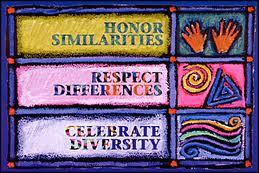 How we treat children and others often influences how they feel about themselves. Teachers face classrooms daily that are filled with children with a variety of backgrounds and needs. Some young learners have very special needs. As educators we need to create classrooms that are inclusive and provide an atmosphere of acceptance and sensitivity that will maximize the success of all students. This week’s book review column from the International Reading Association’s Children’s Literature and Reading Special Interest Group (CL/R SIG) deals with the theme Embracing Disabilities and Differences. Autism, Tourette’s, diabetes, leukemia, accident injury, dyslexia, and multiple sclerosis are just a few of the illnesses or disabilities included in the book reviews.
How we treat children and others often influences how they feel about themselves. Teachers face classrooms daily that are filled with children with a variety of backgrounds and needs. Some young learners have very special needs. As educators we need to create classrooms that are inclusive and provide an atmosphere of acceptance and sensitivity that will maximize the success of all students. This week’s book review column from the International Reading Association’s Children’s Literature and Reading Special Interest Group (CL/R SIG) deals with the theme Embracing Disabilities and Differences. Autism, Tourette’s, diabetes, leukemia, accident injury, dyslexia, and multiple sclerosis are just a few of the illnesses or disabilities included in the book reviews.
Two awards that are noteworthy that deal with books on the topic of children with special needs are:
 Schneider Family Book Award:
Schneider Family Book Award:
http://www.ala.org/awardsgrants/schneider-family-book-award
Last year’s winners: Rose Under Fire by Elizabeth Wein (Teen Book); Handbooks for Dradon Slayers by Merrie Haskell (Middle School); and A Splash of Red; The Life and Art of Horace Pippin by Jen Bryant (Children’s Book).
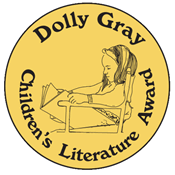 The Dolly Gray Children’s Literature Award:
The Dolly Gray Children’s Literature Award:
http://www.cec.sped.org/News/CEC-Today/Updates/DADD-Book-Award-Promotes-Understanding-and-Acceptance-of-Developmental-Disabilities
ReadWriteThink has collected a group of lesson plans and classroom activities centering on disabilities. A few of these lessons are Inclusive Stories: Teaching about Disabilities with Picture Books and Exploring Disability Using Multimedia and the B-D-A reading Strategy.
Grades K–2
Dudley, Blanche R. (2014). Siggy’s parade; helping kids with disabilities find their strengths. Illus. by John Hazard. Liberty Corner, NJ: New Horizons Press.
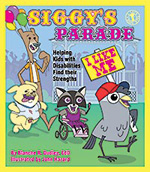 Siggy’s Parade isthe second in a series of books about Siggy, a mockingbird with only one wing. The series addresses tolerance, diversity, and self-esteem. Siggy was rescued and cared for by Mama Sparrow in the first Siggy book, and now he makes his home with the Sparrow family. Encouraged by his new family, Siggy learns to march since he is not able to fly and gains respect from others as well as himself for his accomplishments. All is going well until the blue jay twins, Vickie and Ickie, tease and bully Siggy because he cannot fly. Siggy’s response is to sponsor a parade and invite all his friends who have disabilities, too. Ruthie Raccoon comes in her wheelchair, Tall Paul arrives as the bear that is taller and skinnier than all other bears, and Penelope Pig marches with her hearing aids in place. The author spins a tale of characters that demonstrate self-respect and resourcefulness as they step to the beat of life’s parade. Visit the author’s website for more background information.
Siggy’s Parade isthe second in a series of books about Siggy, a mockingbird with only one wing. The series addresses tolerance, diversity, and self-esteem. Siggy was rescued and cared for by Mama Sparrow in the first Siggy book, and now he makes his home with the Sparrow family. Encouraged by his new family, Siggy learns to march since he is not able to fly and gains respect from others as well as himself for his accomplishments. All is going well until the blue jay twins, Vickie and Ickie, tease and bully Siggy because he cannot fly. Siggy’s response is to sponsor a parade and invite all his friends who have disabilities, too. Ruthie Raccoon comes in her wheelchair, Tall Paul arrives as the bear that is taller and skinnier than all other bears, and Penelope Pig marches with her hearing aids in place. The author spins a tale of characters that demonstrate self-respect and resourcefulness as they step to the beat of life’s parade. Visit the author’s website for more background information.
- Karen Hildebrand, Ohio Library and Reading Consultant
Dumont, Francois. (2014). The geese march in step. Grand Rapids, MI: Eerdmans Books for Young Readers.
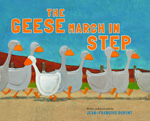 Though this book is not specifically about disabilities, it does celebrate uniqueness and difference. Young Zita cannot (or desires not) to keep step in time to the goose-stepping march of Igor, the head goose, as he marches all the farmyard geese to the pond each morning. Zita creates a beat of her own. Soon the other geese begin to follow Zita’s lead and create an entirely new rhythm for the jaunt to the pond. Joyously sharing in the freedom of being different, young readers will relish the spunk and individuality represented by Zita.
Though this book is not specifically about disabilities, it does celebrate uniqueness and difference. Young Zita cannot (or desires not) to keep step in time to the goose-stepping march of Igor, the head goose, as he marches all the farmyard geese to the pond each morning. Zita creates a beat of her own. Soon the other geese begin to follow Zita’s lead and create an entirely new rhythm for the jaunt to the pond. Joyously sharing in the freedom of being different, young readers will relish the spunk and individuality represented by Zita.
- Karen Hildebrand, Ohio Library and Reading Consultant
Levy, Debbie. (2014). Dozer’s run; a true story of a dog and his race. Sleeping Bear Press. (coming in July)
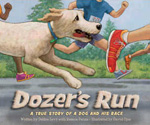 This book is based on the true story of Dozer, the Highland, Maryland Goldendoodle who unknowingly ran in a race to support cancer research in May of 2011. Dozer was a very happy and contented family pet, but one day as he saw runners whizzing past his yard he decided to join them. As Dozer continued to run along the entered participants in the 13-mile Half Marathon sponsored by the University of Maryland’s Greenebaum Cancer Center, Dozer joined over 2,000 runners that day. Cheered along the way, Dozer was the special feature of the marathon and succeeded in increasing the number of pledges. Reunited with his family when the day was done, Dozer and family were proud of the dog’s and all the runners’ accomplishment. Used as a read aloud for young children this story will inspire altruistic and community spirited support for worthy fund-raising.
This book is based on the true story of Dozer, the Highland, Maryland Goldendoodle who unknowingly ran in a race to support cancer research in May of 2011. Dozer was a very happy and contented family pet, but one day as he saw runners whizzing past his yard he decided to join them. As Dozer continued to run along the entered participants in the 13-mile Half Marathon sponsored by the University of Maryland’s Greenebaum Cancer Center, Dozer joined over 2,000 runners that day. Cheered along the way, Dozer was the special feature of the marathon and succeeded in increasing the number of pledges. Reunited with his family when the day was done, Dozer and family were proud of the dog’s and all the runners’ accomplishment. Used as a read aloud for young children this story will inspire altruistic and community spirited support for worthy fund-raising.
- Karen Hildebrand, Ohio Library and Reading Consultant
Napoli, Donna Jo. (2014). Hands & Hearts with 15 words in American Sign Language. Illus. by Amy Bates. New York, NY: Abrams Books for Young Readers.
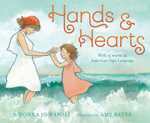 Watercolor and pencil illustrations create a beautiful beach day for mother and daughter as they romp along in the sand and the water. Inviting readers into the play, the mother and daughter communicate through American Sign Language. The text has highlighted words in red and using sidebar illustrations, the ASL finger language is demonstrated. By the end of the book, young readers will see 15 different words told in ASL. This story is a real-world look at using sign language to communicate and express the joys of a splash day at the beach.
Watercolor and pencil illustrations create a beautiful beach day for mother and daughter as they romp along in the sand and the water. Inviting readers into the play, the mother and daughter communicate through American Sign Language. The text has highlighted words in red and using sidebar illustrations, the ASL finger language is demonstrated. By the end of the book, young readers will see 15 different words told in ASL. This story is a real-world look at using sign language to communicate and express the joys of a splash day at the beach.
- Karen Hildebrand, Ohio Library and Reading Consultant
Powers, J. L. (2014). Colors of the Wind: The Story of Blind Artist and Champion Runner. George Mendoza, paintings by George Mendoza, drawings by Hayley Margan-Sanders. Cynthiana, KY: Purple House Press, 2014.
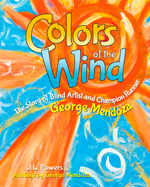 Seventeen full page, full color reproductions of George Mendoza’s paintings steal the attention of the reader, while Powers’ words tell the amazing story of his life and how he became a painter even after losing most of his eyesight due to fundus flavimaculatus, which he has renamed “Kaleidoscope eyes.” Margan-Sanders’s line drawings anchor the text with bits of colors stolen from the colorful page facing it. As a healthy and active child, Mendoza had planned to become a basketball player, but by the age of fifteen, he was legally blind. Later he became a competitive runner and competed in two Olympics for the Disabled in 1980 and 1984. He did not start painting until his thirties. Readers of all ages will enjoy this inspirational book that not only presents Mendoza’s vivid, colorful paintings, but also the story of his life and how his blindness and spirit helped him to excel.
Seventeen full page, full color reproductions of George Mendoza’s paintings steal the attention of the reader, while Powers’ words tell the amazing story of his life and how he became a painter even after losing most of his eyesight due to fundus flavimaculatus, which he has renamed “Kaleidoscope eyes.” Margan-Sanders’s line drawings anchor the text with bits of colors stolen from the colorful page facing it. As a healthy and active child, Mendoza had planned to become a basketball player, but by the age of fifteen, he was legally blind. Later he became a competitive runner and competed in two Olympics for the Disabled in 1980 and 1984. He did not start painting until his thirties. Readers of all ages will enjoy this inspirational book that not only presents Mendoza’s vivid, colorful paintings, but also the story of his life and how his blindness and spirit helped him to excel.
- cj Bott, Ohio Author and Reading Consultant
Walters, Eric. (2013). My name is Blessing. Illus. by Eugenie Fernandes. Toronto, ON: Tundra Books.
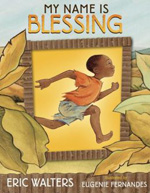 Based on the life of a real boy in Kenya, Muthini (whose name means "suffering") is one of several grandchildren living with his grandmother, Grace. He has a disability that makes it more difficult to care for his needs and so grandmother and Muthini journey to the orphanage where Grace tearfully relinquishes custody of Muthini. He begins a new life with a new name, Baraka that means “blessing.” This poignant story is beautifully and briefly told in an atmosphere of poverty yet filled with love and the sacrifice and desire for a better life. Teachers might like to use this short book trailer to introduce the book or watch this excellent TED talk from the author that provides the background for this book, especially describing his social work background. Visit the author’s website where he talks about creating global citizens and his involvement with Creation of Hope as he works with the orphans of Kenya. A Notable Book for a Global Society winner.
Based on the life of a real boy in Kenya, Muthini (whose name means "suffering") is one of several grandchildren living with his grandmother, Grace. He has a disability that makes it more difficult to care for his needs and so grandmother and Muthini journey to the orphanage where Grace tearfully relinquishes custody of Muthini. He begins a new life with a new name, Baraka that means “blessing.” This poignant story is beautifully and briefly told in an atmosphere of poverty yet filled with love and the sacrifice and desire for a better life. Teachers might like to use this short book trailer to introduce the book or watch this excellent TED talk from the author that provides the background for this book, especially describing his social work background. Visit the author’s website where he talks about creating global citizens and his involvement with Creation of Hope as he works with the orphans of Kenya. A Notable Book for a Global Society winner.
- Karen Hildebrand, Ohio Library and Reading Consultant
Grades 3–5
Davies, Nicola. (2014). The lion who stole my arm. Illus. by Annabel Wright. Candlewick Press.
 From the Publisher: “Zoologist Nicola Davies presents an illustrated novel for young readers that proves you don’t need two arms to be strong.” Set in a village in East Africa, young Pedru loses his arm in a lion attack as he returns from a fishing trip. He vows revenge on the lion as he only has one arm now and will never become the great hunter like his father. When a lion kills another villager, Pedru wants to accompany his father to go after the lion and kill it. When they kill a lion that is tagged from the Madune Carnivore Research Center, Pedru learns of the research being conducted at the Center and begins to rethink his revenge. Later in the story, Pedru does confront the lion that took his arm but he reconsiders the hateful revenge that had filled him before learning about lions and their own survival. Fact-filled notes are included from the author at the end of the book. An action adventure story as well as an ethical environmental lesson, this illustrated novel will appeal to intermediate readers. Visit the author’s webpage for more about her books, her writing, her workshops and blog.
From the Publisher: “Zoologist Nicola Davies presents an illustrated novel for young readers that proves you don’t need two arms to be strong.” Set in a village in East Africa, young Pedru loses his arm in a lion attack as he returns from a fishing trip. He vows revenge on the lion as he only has one arm now and will never become the great hunter like his father. When a lion kills another villager, Pedru wants to accompany his father to go after the lion and kill it. When they kill a lion that is tagged from the Madune Carnivore Research Center, Pedru learns of the research being conducted at the Center and begins to rethink his revenge. Later in the story, Pedru does confront the lion that took his arm but he reconsiders the hateful revenge that had filled him before learning about lions and their own survival. Fact-filled notes are included from the author at the end of the book. An action adventure story as well as an ethical environmental lesson, this illustrated novel will appeal to intermediate readers. Visit the author’s webpage for more about her books, her writing, her workshops and blog.
- Karen Hildebrand, Ohio Library and Reading Consultant
Green, Sara. (2014). Service Dogs. Minneapolis, MN: Bellweather Media.
 Though we love dogs for their companionship or sometimes their “cuddliness,” dogs are also trained as service dogs to assist people who need an extra helping hand…or paw. Written for younger readers, this introduction to the history and training of service dogs will be of interest to children. These dogs are trained specifically for the type of disability that their owner’s have and the dogs will provide assistance in just the right ways to make everyday life easier to handle. From the hearing impaired, to pulling wheelchairs or carrying equipment, these dogs provide loving and useful services for handicapped folks of all ages.
Though we love dogs for their companionship or sometimes their “cuddliness,” dogs are also trained as service dogs to assist people who need an extra helping hand…or paw. Written for younger readers, this introduction to the history and training of service dogs will be of interest to children. These dogs are trained specifically for the type of disability that their owner’s have and the dogs will provide assistance in just the right ways to make everyday life easier to handle. From the hearing impaired, to pulling wheelchairs or carrying equipment, these dogs provide loving and useful services for handicapped folks of all ages.
- Karen Hildebrand, Ohio Library and Reading Consultant
Kumin, Maxine. (2014). Lizzie. New York, NY: Triangle Square.
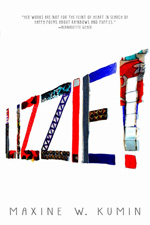 At age nine, Lizzie was injured in a diving accident, and now her life goes on but in a wheelchair. At age eleven, precocious and undaunted, she and her mother are starting a new life in a small town in Florida. Her old friend Trippy comes to visit and encourages her to write her autobiography starting with her accident and resulting injury. Lizzie and Tippy enjoy visiting a nearby petting zoo, but they discover a shack full of screaming tamarin monkeys. They soon suspect that the owner, Henry, or possibly young Julian might be involved in smuggling endangered animals into the country. A quick action story where Lizzie’s wheelchair is but a minor part, this adventure brings to light an international animal rights mystery.
At age nine, Lizzie was injured in a diving accident, and now her life goes on but in a wheelchair. At age eleven, precocious and undaunted, she and her mother are starting a new life in a small town in Florida. Her old friend Trippy comes to visit and encourages her to write her autobiography starting with her accident and resulting injury. Lizzie and Tippy enjoy visiting a nearby petting zoo, but they discover a shack full of screaming tamarin monkeys. They soon suspect that the owner, Henry, or possibly young Julian might be involved in smuggling endangered animals into the country. A quick action story where Lizzie’s wheelchair is but a minor part, this adventure brings to light an international animal rights mystery.
- Karen Hildebrand, Ohio Library and Reading Consultant
Lloyd, Natalie. (2014). A snicker of magic. New York, NY: Scholastic Press.
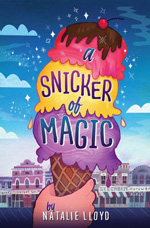 The setting is Midnight Gulch, Tennessee, and legend has it that it was once a magical place. Felicity Pickle and her wandering mother have moved back to Midnight Gulch, where Felicity’s mother grew up. Living with her Mama’s sister, Felicity, little sister Frannie Jo, and their dog Biscuit settle in. Felicity always hates the first day of entering her new schools which she has done more times than she can count as her mother’s wanderlust keeps them on the move. However, this time she meets Jonah. Jonah is in a wheelchair and seems to have a finger on everything that happens in Midnight Gulch. Felicity and Jonah become instant friends and set about to discover where the magic has gone in Midnight Gulch. As the title suggests, this story is truly magical in so many ways. Debut author Natalie Lloyd has provided a wonderfully intriguing story and the fact that Jonah is in a wheelchair is embedded but subliminal to the story line. Teachers will enjoy the fact that Felicity loves to “discover” words, which she keeps track of and plays with them in her writing. Download a detailed Teacher’s Guide here but also visit the publisher’s website for more information.
The setting is Midnight Gulch, Tennessee, and legend has it that it was once a magical place. Felicity Pickle and her wandering mother have moved back to Midnight Gulch, where Felicity’s mother grew up. Living with her Mama’s sister, Felicity, little sister Frannie Jo, and their dog Biscuit settle in. Felicity always hates the first day of entering her new schools which she has done more times than she can count as her mother’s wanderlust keeps them on the move. However, this time she meets Jonah. Jonah is in a wheelchair and seems to have a finger on everything that happens in Midnight Gulch. Felicity and Jonah become instant friends and set about to discover where the magic has gone in Midnight Gulch. As the title suggests, this story is truly magical in so many ways. Debut author Natalie Lloyd has provided a wonderfully intriguing story and the fact that Jonah is in a wheelchair is embedded but subliminal to the story line. Teachers will enjoy the fact that Felicity loves to “discover” words, which she keeps track of and plays with them in her writing. Download a detailed Teacher’s Guide here but also visit the publisher’s website for more information.
- Karen Hildebrand, Ohio Library and Reading Consultant
Rose, Lisa Otter. (2014) You’ve got verve, Jamie Ireland! Create Space Independent Publishing Platform/Amazon Publishing Group.
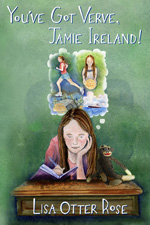 Ten-year old Jamie Ireland seems alone now that her best friend has moved away. Jamie struggles with reading, and writing makes her hand cramp, and spelling is just a jumble of letters. Readers later find out that she is dyslexic. School is a lonely place and full of bullies especially without her old friend. One night during a strange dream Jamie wakes up and goes in search of the book she just dreamt about that pictured a book with a grease-strain shaped like a heart on the cover. She discovers her grandmother’s old cookbook in the attic. Though cooking, especially her grandmother’s apple pie recipe becomes her new interest, her troubles at school continue and even get her suspended for a short time. The guidance counselor suggests she keep a book of quotes each day to give her some inspiration that might guide her thinking. Readers will be anxious to see who wins the baking contest.
Ten-year old Jamie Ireland seems alone now that her best friend has moved away. Jamie struggles with reading, and writing makes her hand cramp, and spelling is just a jumble of letters. Readers later find out that she is dyslexic. School is a lonely place and full of bullies especially without her old friend. One night during a strange dream Jamie wakes up and goes in search of the book she just dreamt about that pictured a book with a grease-strain shaped like a heart on the cover. She discovers her grandmother’s old cookbook in the attic. Though cooking, especially her grandmother’s apple pie recipe becomes her new interest, her troubles at school continue and even get her suspended for a short time. The guidance counselor suggests she keep a book of quotes each day to give her some inspiration that might guide her thinking. Readers will be anxious to see who wins the baking contest.
- Karen Hildebrand, Ohio Library and Reading Consultant
Sovern, Megan Jean. (2014). The meaning of Maggie. San Francisco, CA: Chronicle Books.
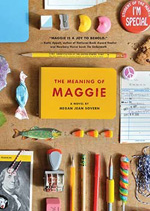 Written through the voice of the author who lived this experience, Maggie Mayfield is an 11-year old writing the memoir of her life during the past year. Defending Science Fair Champion, Student of the Month most months and future President of the United States Maggie is starting into middle school. Life seems to be going well for Maggie, and then the family watches her wheel-chair bound father’s health begin to deteriorate as the MS he is battling takes a turn for the worse. Maggie becomes determined to find a scientific cure for this debilitating disease. Told through Maggie’s humorous memoir journal readers will become engaged with the Mayfield family. Though her father’s health is on a downward slide throughout the book, this story of a family working together to deal with the daily presence and hardships of disease is handled carefully and without over sentimentalizing. Visit the publisher’s website for a book trailer, teacher’s guide and more details about the book. A portion of the proceeds will be donated to the National Multiple Sclerosis Society.
Written through the voice of the author who lived this experience, Maggie Mayfield is an 11-year old writing the memoir of her life during the past year. Defending Science Fair Champion, Student of the Month most months and future President of the United States Maggie is starting into middle school. Life seems to be going well for Maggie, and then the family watches her wheel-chair bound father’s health begin to deteriorate as the MS he is battling takes a turn for the worse. Maggie becomes determined to find a scientific cure for this debilitating disease. Told through Maggie’s humorous memoir journal readers will become engaged with the Mayfield family. Though her father’s health is on a downward slide throughout the book, this story of a family working together to deal with the daily presence and hardships of disease is handled carefully and without over sentimentalizing. Visit the publisher’s website for a book trailer, teacher’s guide and more details about the book. A portion of the proceeds will be donated to the National Multiple Sclerosis Society.
- Karen Hildebrand, Ohio Library and Reading Consultant
Van Vleet, Carmella. (2014). Eliza Bing (is not) a big fat quitter. New York, NY: Holiday House.
 Eliza Bing LOVES cake decorating! She would like to take a class in cake decorating with her best friend Tony, but her parents don’t think she will stick with it because of her ADHD. They financially cannot afford to pay for something they do no believe she will complete. Instead she takes her brother’s spot in the summer tae kwon do session when he drops out and sets out to prove to her parents that she can in fact, complete something. Unfortunately, she quickly learns that you have to really concentrate to learn all the moves and to make matters even more challenging, beautiful cheerleader Madison is in the class. Mean girl Madison has made life tormented for Eliza at school. As her yellow-belt exam approaches and an injury makes it difficult to keep going, Eliza and her family support her as she strives to achieve her goal and move on to cake decorating class. Click here for an extensive teacher’s guide.
Eliza Bing LOVES cake decorating! She would like to take a class in cake decorating with her best friend Tony, but her parents don’t think she will stick with it because of her ADHD. They financially cannot afford to pay for something they do no believe she will complete. Instead she takes her brother’s spot in the summer tae kwon do session when he drops out and sets out to prove to her parents that she can in fact, complete something. Unfortunately, she quickly learns that you have to really concentrate to learn all the moves and to make matters even more challenging, beautiful cheerleader Madison is in the class. Mean girl Madison has made life tormented for Eliza at school. As her yellow-belt exam approaches and an injury makes it difficult to keep going, Eliza and her family support her as she strives to achieve her goal and move on to cake decorating class. Click here for an extensive teacher’s guide.
- Karen Hildebrand, Ohio Library and Reading Consultant
Grades 6–8
Best, Laura. (2014). Flying with a broken wing. Halifax, NS: Nimbus Publishing.
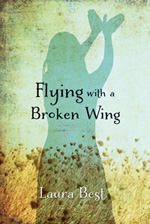 Set near Halifax, Nova Scotia, in the late 1940s and early 1950s, this story deals with Cammie Deveau who is visually impaired. Life has dealt Cammie some very tough hands. Her father was killed in World War II, and her mother abandoned her at birth. She has been left with the questionable Aunt Millie, who is a bootlegger. Ten-year old Cammie decides her life has to change. With the help of her friend Evelyn, Cammie embarks on an adventure that will lead her to Halifax in search of a school for the visually impaired to start a new life that she knows will offer more than her small town. Teachers might like to introduce the books with a book trailer. Check in with the author at her website/blog.
Set near Halifax, Nova Scotia, in the late 1940s and early 1950s, this story deals with Cammie Deveau who is visually impaired. Life has dealt Cammie some very tough hands. Her father was killed in World War II, and her mother abandoned her at birth. She has been left with the questionable Aunt Millie, who is a bootlegger. Ten-year old Cammie decides her life has to change. With the help of her friend Evelyn, Cammie embarks on an adventure that will lead her to Halifax in search of a school for the visually impaired to start a new life that she knows will offer more than her small town. Teachers might like to introduce the books with a book trailer. Check in with the author at her website/blog.
- Karen Hildebrand, Ohio Library and Reading Consultant
Rodger, Marguerite. (2014). Autism spectrum disorder. New York, NY: Crabtree Publishing.
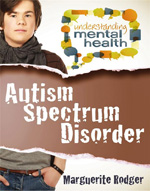 From the Understanding Mental Health series, this book describes and explains autism, Asperger Syndrome, Pervasive Developmental Disorders, and more. Children and adults struggle with the social interaction and communication that often accompany these illnesses. Diagnosis can often be difficult. Next steps after diagnosis and learning to live with the illness are also discussed as the caretakers involved in the care of the people and loved ones diagnosed reach for understanding and acceptance. How these conditions affect family and friends is explained. Chapter titles include: On the spectrum; What is ASD?; Diagnosis and treatment; Dealing with stigma; Managing behavior; Making friends; Family ties; ASD toolbox.
From the Understanding Mental Health series, this book describes and explains autism, Asperger Syndrome, Pervasive Developmental Disorders, and more. Children and adults struggle with the social interaction and communication that often accompany these illnesses. Diagnosis can often be difficult. Next steps after diagnosis and learning to live with the illness are also discussed as the caretakers involved in the care of the people and loved ones diagnosed reach for understanding and acceptance. How these conditions affect family and friends is explained. Chapter titles include: On the spectrum; What is ASD?; Diagnosis and treatment; Dealing with stigma; Managing behavior; Making friends; Family ties; ASD toolbox.
- Karen Hildebrand, Ohio Library and Reading Consultant
Grades 9–12
Aslan, Austin. (2014). Islands at the end of the world. New York, NY: Wendy Lamb Books. (coming in August)
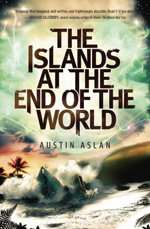 Set against the backdrop of Hawaiian history and mythology, Leilani (Lei) and her father begin a journey from the Big Island of Hawaii to Oahu. They are trying to find a cure for the epilepsy that grips Lei and causes her to lose control of her world. The fast-paced adventure of the story takes over when a meteor strike causes the shutdown of all electrical devices, limiting communications. As chaos reigns around them, her supply of medicine to keep the epilepsy in check is running low. Another subplot enters as nationalist forces gain militant strength and try to restore the islands to their indigenous rule. During one of Lei’s seizures she appears to have a vision of the Green Orchid. She does not understand what this vision means but feels it has a message for her to decipher. This is the first of two novels from the author, who has a master’s degree in tropical conservation biology from the University of Hawaii at Hilo.
Set against the backdrop of Hawaiian history and mythology, Leilani (Lei) and her father begin a journey from the Big Island of Hawaii to Oahu. They are trying to find a cure for the epilepsy that grips Lei and causes her to lose control of her world. The fast-paced adventure of the story takes over when a meteor strike causes the shutdown of all electrical devices, limiting communications. As chaos reigns around them, her supply of medicine to keep the epilepsy in check is running low. Another subplot enters as nationalist forces gain militant strength and try to restore the islands to their indigenous rule. During one of Lei’s seizures she appears to have a vision of the Green Orchid. She does not understand what this vision means but feels it has a message for her to decipher. This is the first of two novels from the author, who has a master’s degree in tropical conservation biology from the University of Hawaii at Hilo.
- Karen Hildebrand, Ohio Library and Reading Consultant
Conaghan, Brian. (2014). When Mr. Dog bites. New York, NY: Bloomsbury.
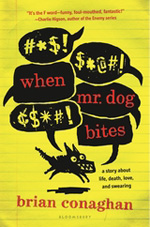 British author Brian Conaghan makes his U.S. debut with the character of 16-year-old Dylan Mint who has Tourette’s syndrome. This story rings true as the author has Tourette’s and the voice of Dylan reflects the experiences of the author. When Dylan overhears a conversation at his doctor’s office, he learns that he has only eight months to live. Deciding to make the best of it he creates a list entitled “Cool Things to Do Before I Cack It.” Filled with British and Scottish slang and abundant use of 4-letter swear words and more, Dylan proceeds to conquer his to-do list. Just to name a few at the top are: to have sex, to find a new best friend for his best friend Amir, and to get his father home from Afghanistan. Though the ending may seem a bit pat and the language comes with an R-rating (as is often the case with Tourette’s syndrome), this inside look at this very difficult illness will ring true to readers. Visit the publisher’s website and listen to the author discuss this book.
British author Brian Conaghan makes his U.S. debut with the character of 16-year-old Dylan Mint who has Tourette’s syndrome. This story rings true as the author has Tourette’s and the voice of Dylan reflects the experiences of the author. When Dylan overhears a conversation at his doctor’s office, he learns that he has only eight months to live. Deciding to make the best of it he creates a list entitled “Cool Things to Do Before I Cack It.” Filled with British and Scottish slang and abundant use of 4-letter swear words and more, Dylan proceeds to conquer his to-do list. Just to name a few at the top are: to have sex, to find a new best friend for his best friend Amir, and to get his father home from Afghanistan. Though the ending may seem a bit pat and the language comes with an R-rating (as is often the case with Tourette’s syndrome), this inside look at this very difficult illness will ring true to readers. Visit the publisher’s website and listen to the author discuss this book.
- Karen Hildebrand, Ohio Library and Reading Consultant
Kehoe, Stasia Ward. (2014). The sound of letting go. New York, NY: Viking/Penguin.
 Writing in the novel in verse format, this is the story of Daisy Meehan and her family’s dealing with the everyday existence of her brother Steven’s autism. Daisy has always been the good daughter, especially enjoying playing the trumpet in her high school jazz band. When her parents’ finances and emotions are drained, they decide to send the often-violent Steven to a group home. Daisy is furious at the decision and especially that she was not given any voice in the decision. Her reaction is to become that “bad girl.” As Daisy is conflicted about her parents, her brother and her life in general, music is a constant that seems to bring a little peace to her. Friendships and romances are shifting, as are her family dynamics. This offers a harsh but realistic look at one family’s struggle to try to find normalcy. Read an interview with the author at Autism Speaks.
Writing in the novel in verse format, this is the story of Daisy Meehan and her family’s dealing with the everyday existence of her brother Steven’s autism. Daisy has always been the good daughter, especially enjoying playing the trumpet in her high school jazz band. When her parents’ finances and emotions are drained, they decide to send the often-violent Steven to a group home. Daisy is furious at the decision and especially that she was not given any voice in the decision. Her reaction is to become that “bad girl.” As Daisy is conflicted about her parents, her brother and her life in general, music is a constant that seems to bring a little peace to her. Friendships and romances are shifting, as are her family dynamics. This offers a harsh but realistic look at one family’s struggle to try to find normalcy. Read an interview with the author at Autism Speaks.
- Karen Hildebrand, Ohio Library and Reading Consultant
McNeese, Tim. (2014). Disability rights movement. ABDO Publishing Company.
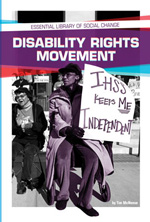 From the Essential Library of Social Change series, this volume presents the social history of disability rights. It focuses on the history of the movement and its struggle for recognition until the actual legislation in 1990 that created the Americans with Disabilities Act. The book develops chronologically and features a few institutions and their rules and guidelines for people with disabilities even to the point of banning people with disabilities from specific places. An example discussed was the number of maimed soldiers returning from the Civil War and the passage of “ugly laws” to keep these disabled veterans away from certain establishments. Great strides were made in the 20th Century, particularly under the administration of President Franklin D. Roosevelt. Photographs, sidebars, timelines, bibliographies, and a glossary are included.
From the Essential Library of Social Change series, this volume presents the social history of disability rights. It focuses on the history of the movement and its struggle for recognition until the actual legislation in 1990 that created the Americans with Disabilities Act. The book develops chronologically and features a few institutions and their rules and guidelines for people with disabilities even to the point of banning people with disabilities from specific places. An example discussed was the number of maimed soldiers returning from the Civil War and the passage of “ugly laws” to keep these disabled veterans away from certain establishments. Great strides were made in the 20th Century, particularly under the administration of President Franklin D. Roosevelt. Photographs, sidebars, timelines, bibliographies, and a glossary are included.
- Karen Hildebrand, Ohio Library and Reading Consultant
Murphy, Julie. (2014). Side effects may vary. New York, NY: Balzer + Bray/HarperCollins.
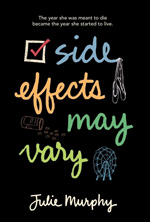 The publisher’s blurb reads: “The Fault in Our Stars meets Sarah Dessen in this lyrical novel about a girl with cancer who creates a take-no-prisoners bucket list that sets off a war at school—only to discover she has gone into remission.” Sixteen-year-old Alice has just finished a grueling year of chemo to treat her acute lymphocytic leukemia. Knowing she had no future, she created her Just Dying To-Do List. She engages the help of her lifelong friend, Harvey, who is in love with her. Told in alternating chapters between Alice and Harvey, they plot all the revenge that Alice needs to complete. Suddenly, Alice finds out her cancer is in remission and she has a future after all. Now she has to live with all the cruel things she did on her bucket list. This debut author creates an interesting juxtaposition of cancer and death and then life after all.
The publisher’s blurb reads: “The Fault in Our Stars meets Sarah Dessen in this lyrical novel about a girl with cancer who creates a take-no-prisoners bucket list that sets off a war at school—only to discover she has gone into remission.” Sixteen-year-old Alice has just finished a grueling year of chemo to treat her acute lymphocytic leukemia. Knowing she had no future, she created her Just Dying To-Do List. She engages the help of her lifelong friend, Harvey, who is in love with her. Told in alternating chapters between Alice and Harvey, they plot all the revenge that Alice needs to complete. Suddenly, Alice finds out her cancer is in remission and she has a future after all. Now she has to live with all the cruel things she did on her bucket list. This debut author creates an interesting juxtaposition of cancer and death and then life after all.
- Karen Hildebrand, Ohio Library and Reading Consultant
Perry, Jolene. (2014). The summer I found you. Chicago: Albert Whitman.
 Kate, recently dumped by her dream boyfriend, has just been diagnosed with Type I Diabetes. A few weeks later, she meets Aidan who has recently returned from Afghanistan where his arm was blown off. He had intended to make the army his career. As their life plans change, they become a romantic couple, though Kate has not yet confided to Aidan that she is diabetic. Told in alternating voice chapters and their romance evolves, they tell their stories of living with their recent life-changing disabilities.
Kate, recently dumped by her dream boyfriend, has just been diagnosed with Type I Diabetes. A few weeks later, she meets Aidan who has recently returned from Afghanistan where his arm was blown off. He had intended to make the army his career. As their life plans change, they become a romantic couple, though Kate has not yet confided to Aidan that she is diabetic. Told in alternating voice chapters and their romance evolves, they tell their stories of living with their recent life-changing disabilities.
- Karen Hildebrand, Ohio Library and Reading Consultant
Struyk-Bonn, Christina. (2014). Whisper. Toronto: Orca Book Publishers.
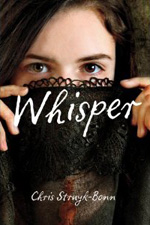 Sixteen-year-old Whisper is born with a cleft palate in a future dystopian society. Living in a society that rejects those born with imperfections, she is abandoned by her parents and now lives in an encampment with other societal rejects. Nathaniel is their caregiver and runs their part of the camp. Whisper’s mother visits once a year, and when she dies she leaves Whisper a violin and she learns to play while in the camp. Eventually her father comes for her, and she works in his household under cover of a veil. She is nothing more than a servant, and her rebellious spirit forces her to leave this household. She lives among a community of rebels and misfits and begins to suspect that the SWINC corporation could be responsible for the many birth defects that seem far too frequent in their community. Questions abound as medical and geophysical forces come into play with Whisper at the center of it all.
Sixteen-year-old Whisper is born with a cleft palate in a future dystopian society. Living in a society that rejects those born with imperfections, she is abandoned by her parents and now lives in an encampment with other societal rejects. Nathaniel is their caregiver and runs their part of the camp. Whisper’s mother visits once a year, and when she dies she leaves Whisper a violin and she learns to play while in the camp. Eventually her father comes for her, and she works in his household under cover of a veil. She is nothing more than a servant, and her rebellious spirit forces her to leave this household. She lives among a community of rebels and misfits and begins to suspect that the SWINC corporation could be responsible for the many birth defects that seem far too frequent in their community. Questions abound as medical and geophysical forces come into play with Whisper at the center of it all.
- Karen Hildebrand, Ohio Library and Reading Consultant
Venkatraman, Padma. (2014). A time to dance. New York: Nancy Paulsen Books.
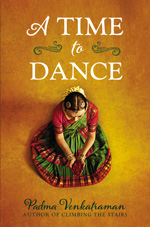 Using the novel in verse format, this is a story of India, of smells and scents, of dance and determination. Veda is a classical dance prodigy of the bharatanatyam dance form. Sadly, following a terrible accident on the very day she won first place in her cherished dance contest, her leg is amputated below the knee. At first despondent in the hospital, an American doctor gives her new hope that her dance career is not over. She is now learning to walk on a prosthetic leg. Refusing to let this keep her from her love of dance, she enrolls in beginner dance lessons to relearn how to dance on her new prosthesis. Govinda is her new dance instructor, and before long they fall in love. Govinda encourages her that dancers have ten talents. She has lost three, but only for a while. Infused with pieces of Hinduism and Buddhism, Veda struggles back to the dance. The struggle also takes her to a new place within herself with an awakening about who she is and the future ahead. Backstory at the author’s website www.padmasbooks.com/todanceagain.html.
Using the novel in verse format, this is a story of India, of smells and scents, of dance and determination. Veda is a classical dance prodigy of the bharatanatyam dance form. Sadly, following a terrible accident on the very day she won first place in her cherished dance contest, her leg is amputated below the knee. At first despondent in the hospital, an American doctor gives her new hope that her dance career is not over. She is now learning to walk on a prosthetic leg. Refusing to let this keep her from her love of dance, she enrolls in beginner dance lessons to relearn how to dance on her new prosthesis. Govinda is her new dance instructor, and before long they fall in love. Govinda encourages her that dancers have ten talents. She has lost three, but only for a while. Infused with pieces of Hinduism and Buddhism, Veda struggles back to the dance. The struggle also takes her to a new place within herself with an awakening about who she is and the future ahead. Backstory at the author’s website www.padmasbooks.com/todanceagain.html.
- Karen Hildebrand, Ohio Library and Reading Consultant
Watch for in December
Sundquist, Josh. (2014). We should hang out sometime: Embarrassingly, a true story. New York, NY: Little Brown. Paralympic skier Josh Sundquist’s memoir of coming of age as an amputee cancer survivor.
Additional Resources
Bookshare
www.bookshare.org
Christopher and Dana Reeve Foundation
www.christopherreeve.org/atf/cf/%7B173bca02-3665-49ab-9378-be009c58a5d3%7D/CHILDREN'S%20AND%20TEEN%20BOOKS.VIDEOS%20ON%20DISABILITY%203-11.PDF
Teacher’s Books on Disablities
http://blanchedudley.com/siggys-parade/
Books on the Disability Experience
www.nlcdd.org/resources-books-movies-disability.html
Children with Disabilities: Bibliography and Teacher’s Guide
www.state.nj.us/humanservices/documents/ChildrensBiblioDisabilityBooks.pdf
Jessica Kingsley Publishers
www.jkp.com/
IBBY
www.ibby.org/index.php?id=271
National Center for Learning Disabilities
www.ncld.org/parents-child-disabilities/family-coping-ld/recommended-reading-children-ld
March is Developmental Disabilities Awareness Month
www.specialneedsalliance.org/march-is-developmental-disabilities-awareness-month/
Facebook: Embracing Disabilities
www.facebook.com/embracingdisabilities
These reviews and resources are submitted by members of the International Reading Association’s Children’s Literature and Special Interest Group (CL/R SIG) and are published weekly on Reading Today Online.
The International Reading Association partners with the National Council of Teachers of English and Verizon Thinkfinity to produce ReadWriteThink.org, a website devoted to providing literacy instruction and interactive resources for Grades K–12.